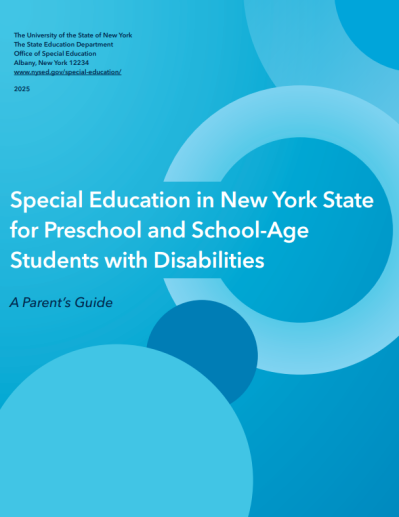Special Education in New York State for Preschool and School-Age Students with Disabilities, A Parent’s Guide
To ensure students with disabilities receive a free appropriate public education in the least restrictive environment, there are essential and fundamental procedural rights and protections afforded to parents by the federal Individuals with Disabilities Education Act (IDEA), the federal regulations that implement IDEA [34 CFR Part 300], Article 89 of the New York State (NYS) Education Law, and Part 200 of the NYS Commissioner’s Regulations.
The 2025 Special Education in New York State for Preschool and School-Age Students with Disabilities, A Parent’s Guide is intended to provide parents and persons with parental relationship with:
- a broad overview of the special education process in NYS; and
- a resource to help understand some of the rights and protections provided by federal and New York State law and regulations to parents and students throughout the process.
In accordance with New York State Education Law section 4402(1)(b)(6), the committee on preschool special education (CPSE)/committee on special education (CSE) must provide a copy of the Parent’s Guide or a locally approved handbook to the parents or person in parental relationship as soon as practicable after their child has been referred for evaluation to determine eligibility for special education services or programs.
The Parent’s Guide may also be used to satisfy a school district’s obligation under New York State Education Law section 4402(8) to notify every parent or persons in parental relationship of their rights regarding referral and evaluation of their child for the purposes of special education services or programs upon their child’s enrollment or attendance in a public school. Such notification may be provided by directing the parents or persons in parental relationship to obtain information in the Parent’s Guide located on the New York State Education Department’s website, provided the notification also contains the name and contact information for the chairperson of the school district’s CSE or other individual in the district who is charged with processing referrals for special education.
Translated versions will be forthcoming.






